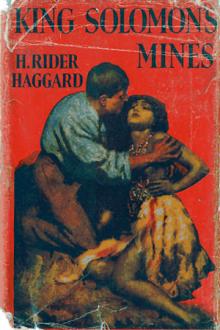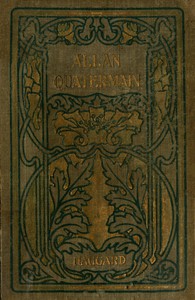King Solomon's Mines, H. Rider Haggard [top 10 ebook reader TXT] 📗

- Author: H. Rider Haggard
Book online «King Solomon's Mines, H. Rider Haggard [top 10 ebook reader TXT] 📗». Author H. Rider Haggard
So after we were rested a little, and the Kafirs had cut out the hearts of two of the dead elephants for supper, we started homewards, very well pleased with our day’s work, having made up our minds to send the bearers on the morrow to chop away the tusks.
Shortly after we re-passed the spot where Good had wounded the patriarchal bull we came across a herd of eland, but did not shoot at them, as we had plenty of meat. They trotted past us, and then stopped behind a little patch of bush about a hundred yards away, wheeling round to look at us. As Good was anxious to get a near view of them, never having seen an eland close, he handed his rifle to Umbopa, and, followed by Khiva, strolled up to the patch of bush. We sat down and waited for him, not sorry of the excuse for a little rest.
The sun was just going down in its reddest glory, and Sir Henry and I were admiring the lovely scene, when suddenly we heard an elephant scream, and saw its huge and rushing form with uplifted trunk and tail silhouetted against the great fiery globe of the sun. Next second we saw something else, and that was Good and Khiva tearing back towards us with the wounded bull—for it was he—charging after them. For a moment we did not dare to fire—though at that distance it would have been of little use if we had done so—for fear of hitting one of them, and the next a dreadful thing happened—Good fell a victim to his passion for civilised dress. Had he consented to discard his trousers and gaiters like the rest of us, and to hunt in a flannel shirt and a pair of veldt-schoons, it would have been all right. But as it was, his trousers cumbered him in that desperate race, and presently, when he was about sixty yards from us, his boot, polished by the dry grass, slipped, and down he went on his face right in front of the elephant.
We gave a gasp, for we knew that he must die, and ran as hard as we could towards him. In three seconds it had ended, but not as we thought. Khiva, the Zulu boy, saw his master fall, and brave lad as he was, turned and flung his assegai straight into the elephant’s face. It stuck in his trunk.
With a scream of pain, the brute seized the poor Zulu, hurled him to the earth, and placing one huge foot on to his body about the middle, twined its trunk round his upper part and tore him in two.
We rushed up mad with horror, and fired again and again, till presently the elephant fell upon the fragments of the Zulu.
As for Good, he rose and wrung his hands over the brave man who had given his life to save him, and, though I am an old hand, I felt a lump grow in my throat. Umbopa stood contemplating the huge dead elephant and the mangled remains of poor Khiva.
“Ah, well,” he said presently, “he is dead, but he died like a man!”
OUR MARCH INTO THE DESERT
We had killed nine elephants, and it took us two days to cut out the tusks, and having brought them into camp, to bury them carefully in the sand under a large tree, which made a conspicuous mark for miles round. It was a wonderfully fine lot of ivory. I never saw a better, averaging as it did between forty and fifty pounds a tusk. The tusks of the great bull that killed poor Khiva scaled one hundred and seventy pounds the pair, so nearly as we could judge.
As for Khiva himself, we buried what remained of him in an ant-bear hole, together with an assegai to protect himself with on his journey to a better world. On the third day we marched again, hoping that we might live to return to dig up our buried ivory, and in due course, after a long and wearisome tramp, and many adventures which I have not space to detail, we reached Sitanda’s Kraal, near the Lukanga River, the real starting-point of our expedition. Very well do I recollect our arrival at that place. To the right was a scattered native settlement with a few stone cattle kraals and some cultivated lands down by the water, where these savages grew their scanty supply of grain, and beyond it stretched great tracts of waving “veld” covered with tall grass, over which herds of the smaller game were wandering. To the left lay the vast desert. This spot appears to be the outpost of the fertile country, and it would be difficult to say to what natural causes such an abrupt change in the character of the soil is due. But so it is.
Just below our encampment flowed a little stream, on the farther side of which is a stony slope, the same down which, twenty years before, I had seen poor Silvestre creeping back after his attempt to reach Solomon’s Mines, and beyond that slope begins the waterless desert, covered with a species of karoo shrub.
It was evening when we pitched our camp, and the great ball of the sun was sinking into the desert, sending glorious rays of many-coloured light flying all over its vast expanse. Leaving Good to superintend the arrangement of our little camp, I took Sir Henry with me, and walking to the top of the slope opposite, we gazed across the desert. The air was very clear, and far, far away I could distinguish the faint blue outlines, here and there capped with white, of the Suliman Berg.
“There,” I said, “there is the wall round Solomon’s Mines, but God knows if we shall ever climb it.”
“My brother should be there, and if he is, I shall reach him somehow,” said Sir Henry, in that tone of quiet confidence which marked the man.
“I hope so,” I answered, and turned to go back to the camp, when I saw that we were not alone. Behind us, also gazing earnestly towards the far-off mountains, stood the great Kafir Umbopa.
The Zulu spoke when he saw that I had observed him, addressing Sir Henry, to whom he had attached himself.
“Is it to that land that thou wouldst journey, Incubu?” (a native word meaning, I believe, an elephant, and the name given to Sir Henry by the Kafirs), he said, pointing towards the mountain with his broad assegai.
I asked him sharply what he meant by addressing his master in that familiar way. It is very well for natives to have a name for one among themselves, but it is not decent that they should call a white man by their heathenish appellations to his face. The Zulu laughed a quiet little laugh which angered me.
“How dost thou know that I am not the equal of the Inkosi whom I serve?” he said. “He is of a royal house, no doubt; one can see it in his size and by his mien; so, mayhap, am I. At least, I am as great a man. Be my mouth, O Macumazahn, and say my words to the Inkoos Incubu, my master, for I would speak to him and to thee.”
I was angry with the man, for I am not accustomed to be talked to in that way by Kafirs, but somehow he impressed me, and besides I was curious to know what he had to say. So I translated, expressing my opinion at the same time that he was an impudent fellow, and that his swagger was outrageous.
“Yes, Umbopa,” answered Sir Henry, “I would journey there.”
“The desert is wide and there is no water in it, the mountains are high and covered with snow, and man cannot say what lies beyond them behind the place where the sun sets; how shalt thou come thither, Incubu, and wherefore dost thou go?”
I translated again.
“Tell him,” answered Sir Henry, “that I go because I believe that a man of my blood, my brother, has gone there before me, and I journey to seek him.”
“That is so, Incubu; a Hottentot I met on the road told me that a white man went out into the desert two years ago towards those mountains with one servant, a hunter. They never came back.”
“How do you know it was my brother?” asked Sir Henry.
“Nay, I know not. But the Hottentot, when I asked what the white man was like, said that he had thine eyes and a black beard. He said, too, that the name of the hunter with him was Jim; that he was a Bechuana hunter and wore clothes.”
“There is no doubt about it,” said I; “I knew Jim well.”
Sir Henry nodded. “I was sure of it,” he said. “If George set his mind upon a thing he generally did it. It was always so from his boyhood. If he meant to cross the Suliman Berg he has crossed it, unless some accident overtook him, and we must look for him on the other side.”
Umbopa understood English, though he rarely spoke it.
“It is a far journey, Incubu,” he put in, and I translated his remark.
“Yes,” answered Sir Henry, “it is far. But there is no journey upon this earth that a man may not make if he sets his heart to it. There is nothing, Umbopa, that he cannot do, there are no mountains he may not climb, there are no deserts he cannot cross, save a mountain and a desert of which you are spared the knowledge, if love leads him and he holds his life in his hands counting it as nothing, ready to keep it or lose it as Heaven above may order.”
I translated.
“Great words, my father,” answered the Zulu—I always called him a Zulu, though he was not really one—“great swelling words fit to fill the mouth of a man. Thou art right, my father Incubu. Listen! what is life? It is a feather, it is the seed of the grass, blown hither and thither, sometimes multiplying itself and dying in the act, sometimes carried away into the heavens. But if that seed be good and heavy it may perchance travel a little way on the road it wills. It is well to try and journey one’s road and to fight with the air. Man must die. At the worst he can but die a little sooner. I will go with thee across the desert and over the mountains, unless perchance I fall to the ground on the way, my father.”
He paused awhile, and then went on with one of those strange bursts of rhetorical eloquence that Zulus sometimes indulge in, which to my mind, full though they are of vain repetitions, show that the race is by no means devoid of poetic instinct and of intellectual power.
“What is life? Tell me, O white men, who are wise, who know the secrets of the world, and of the world of stars, and the world that lies above and around the stars; who flash your words from afar without a voice; tell me, white men, the secret of our life—whither it goes and whence it comes!
“You cannot answer me; you know not. Listen, I will answer. Out of the dark we came, into the dark we go. Like a storm-driven bird at night we fly





Comments (0)